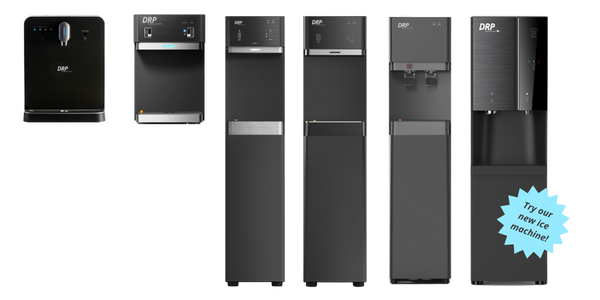By: Ali Cohen

Recent reports have shed light on the alarming presence of PFAS (Per- and Polyfluoroalkyl Substances), commonly known as “Forever Chemicals,” in drinking water sources. These synthetic compounds, found in a wide range of products and industrial processes, have been linked to severe health risks. Long Island, in particular, has faced a pressing issue with over a million residents consuming PFAS-contaminated water, surpassing the recommended health advisory standards set by the Environmental Protection Agency (EPA). In this blog post, we will explore the dangers of PFAS chemicals, their impact on human health, and the effectiveness of carbon-based filters, such as the ones employed by DRP’s bottleless water dispensers, in ensuring the safety and quality of drinking water.
Understanding PFAS and Health Risks
PFAS chemicals are a class of human-made substances that do not naturally occur in the environment. They have been widely used in various consumer products, including non-stick cookware, water-repellent fabrics, firefighting foams, and food packaging. Due to their widespread use and persistence in the environment, PFAS compounds have contaminated water sources across the globe.
Scientific studies have linked exposure to PFAS chemicals with adverse health effects. Prolonged consumption of water containing high levels of PFAS can lead to an increased risk of kidney and testicular cancer, thyroid disease, developmental issues in infants and children, immune system dysfunction, and other serious health concerns. Given the potential long-term consequences, it is crucial to address this issue promptly.
The Role of Carbon-Based Filters
Carbon-based filters have gained recognition as an effective method for removing PFAS chemicals from contaminated drinking water. These filters typically utilize activated carbon, which has a large surface area and a high capacity for adsorption. When water passes through the filter, PFAS compounds adhere to the carbon surface, effectively removing them from the water.
DRP's Multi-Stage Filtration Process
DRP’s bottleless water dispensers employ an advanced multi-stage filtration process designed to address various water quality concerns, including the removal of PFAS chemicals. The multi-stage filtration system consists of different filter cartridges, each targeting specific contaminants.
Carbon filters play a vital role in this process. They efficiently trap and remove PFAS compounds, ensuring that the water dispensed is free from these harmful substances. The use of activated carbon in DRP’s filters provides an added advantage as it also helps eliminate other contaminants, such as chlorine, pesticides, and heavy metals, enhancing the taste and overall quality of the water.

Sediment Filter
The 1st filter is a 10 micron filter, which reduces sediment such as rust, dust, clay and pipe residue.

Pre-Carbon Filter
The 2nd filter is a pre carbon filter to reduce chemicals such as chlorine, solvents, pesticides and various organic compounds.

Ultra Fine Membrane
Ultrafiltration uses a highly advanced .05 micron membrane that reduces metals, arsenic, pharmaceuticals, lead, mercury and other solids.

Bio-Sure Plus™
Restores/adds more than 20 minerals and electrolytes to increase alkalinity and clean water with colloidal silver.

Sediment Filter
Water passes through a Post Carbon Filter with coconut shell sediment polishing for improved taste.
Benefits of DRP's Bottleless Water Dispensers
By utilizing DRP’s bottleless water dispensers with their advanced multi-stage filtration process, users can enjoy several advantages:
Safety: DRP’s filtration system guarantees the removal of PFAS chemicals, making the water safe for consumption. Users can have peace of mind knowing that their drinking water meets stringent quality standards.
Taste and Quality: The carbon-based filters not only eliminate harmful contaminants but also improve the taste and odor of the water. This ensures a refreshing and enjoyable drinking experience.
Convenience and Sustainability: DRP’s bottleless water dispensers eliminate the need for single-use plastic bottles, reducing environmental waste. With a continuous supply of filtered water, users can conveniently access clean drinking water without the hassle of purchasing or storing bottled water.
In Conclusion
The presence of PFAS chemicals in drinking water poses a significant risk to human health. Taking action to ensure the removal of these contaminants is crucial for safeguarding the well-being of individuals and communities. Carbon-based filters, such as the ones employed by DRP’s bottleless water dispensers, offer an effective solution for purifying contaminated water. By using activated carbon filters, DRP’s filtration system not only removes PFAS chemicals but also enhances the taste and quality of the water. Investing in reliable filtration systems like these is a proactive step towards protecting ourselves from the hazards of PFAS and ensuring access to safe, clean drinking water for everyone.
Take immediate action to guarantee the cleanliness of your drinking water.
Enroll today for a complimentary one-week trial of one of DRP Solutions’ bottleless water dispensers and enjoy the assurance of having pure, filtered water.

